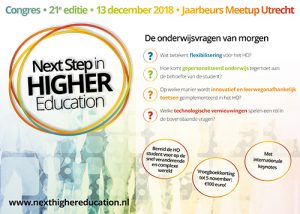 Peer support, teacher’s motivation, student goals, student motivation, self-efficacy beliefs, self-regulation, teaching method and student – teacher interaction: there are so many variables that define the success of a Higher Education system. In this intertwined process of different variables it’s difficult to say which variable actually impacts an individual student. How do you chose a direction with your higher education institution?
Peer support, teacher’s motivation, student goals, student motivation, self-efficacy beliefs, self-regulation, teaching method and student – teacher interaction: there are so many variables that define the success of a Higher Education system. In this intertwined process of different variables it’s difficult to say which variable actually impacts an individual student. How do you chose a direction with your higher education institution?
Two important take-aways from Sari Lindbom, vice rector University of Helsinki:
– Think on a program level
– Collect evidence in order to be able to take the next step
The importance of empirical evidence for innovation in Higher Education
It is necessary that in research-intensive universities strategic decisions concerning the future directions of teaching, learning and curriculum be based on empirical evidence. Different disciplines need to be taken into account in order to choose functional and effective solutions for each teacher, student and study program.
However, doing research in real life situations like higher education can be challenging and difficult. You cannot easily divide groups in a control and experimental group, because they are actually impacted day by day with the education they are following. This is why research needs to be done in another way, where there is an attempt to control some factors so as to identify which of them contribute to high-quality teaching and learning.
One could argue that some educational findings from research make sense intuitively, but it is always important to confirm teachers’ instincts. Empirical evidence often reveals complicated inter-relationships or even counter-intuitive aspects which need to be taken into account. An example of this is the variable of ‘stress’, too much stress is bad for a student’s motivation but if there is no stress at all, motivation could disappear as well. Research gives structure to find the right level of stress for students. This is but one example of the fine line needed to create an optimal educational environment that is aided by research.
Close the gap between university and working life
The University of Helsinki decided to create more multidisciplinary bachelor programs, so they went from 100 to 30 bachelors. After the bachelor you can chose two different master programs. In their education they added a compulsory working life module to all bachelor programs. For those modules they ask their alumni connections to help students to work with a project or company and thus practice their presentation skills and more. The working life module helps students to give them an idea of working life.
For students to flourish in working life, they need to develop some generic skills such as academic thinking, critical thinking, problem solving, analyzing and applying knowledge. In addition to those, skills such as communication, personal development, self-regulation and time management skills are also very important to develop during their university education. Current research shows a large amount of variation in these skills from students after finishing university. A mix of students feel they do not have enough of these skills, some feel they do.
Free education, a gift or a martyrdom?
There is no hurry to graduate in Finland, as doubting one’s future career is one of the main reasons to prolong a study, thus trying out different things and studying for a longer time. In this system a formation of career identity is easier in professional programs like medicine, law or teacher education. However, some students in non-professional programs experience challenges with the formation of career-identity. This is especially the case with humanity students, when they enter universities they are interested in many areas and what happens is ruminative exploration. Exploration is important, but after the exploration phase a commitment phase is necessary to make some choices.
There is an example of a student who was a strategic delayer, the student didn’t have a bachelor degree yet but already collected enough credits to graduate with two bachelors and two majors!
Next Step in Higher Education
Take the Next Step! Een congres over de onderwijsvragen van morgen. Ontdek op dit congres op welke manieren verschillende Hogescholen en Universiteiten in Nederland en op de wereld omgaan met De Onderwijsvragen anno 2018. Laat je inspireren door de changemakers in vernieuwend, flexibel en persoonlijk onderwijs
Meer informatie SBO Blog Het blog van Studiecentrum voor Bedrijf en Overheid
SBO Blog Het blog van Studiecentrum voor Bedrijf en Overheid




